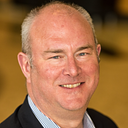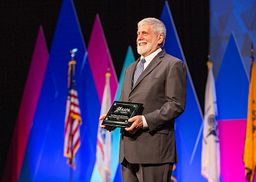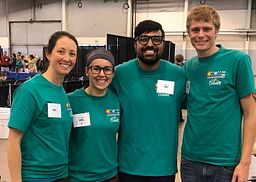‘Making a Difference Where I Can’
At the AAPA annual conference in May, former ŽóÏăœ¶ÊÓÆ” president, longtime PA educator, and CASPA founding father Ted Ruback, MS, PA-C Emeritus,, the PA professionâs highest honor, for his many contributions to the profession â following in the footsteps of. As he settles into a well-deserved retirement, ŽóÏăœ¶ÊÓÆ” caught up with him to dig a little deeper into what drove his remarkable career.
It is fitting that it was his relationship with a boy in need that got Ruback into the PA profession. Children have always been an important part of his life; he and his wife fostered two children in addition to raising their own two boys. Ruback also spent all of his 12-year full-time clinical career in general pediatrics, following graduation from the University of Colorado Child Health Associate/PA program in 1979.
In the mid-1970s, Ruback was working with John, a 12-year-old boy in Denver, through Partners, a Big Brother/Big Sister-type organization, and took John to a career fair, where some CHA/PA students happened to be staffing a table. Like most people in those days, he knew nothing about the PA profession, but it sounded perfect for him so he applied to the Colorado program. He was accepted as an alternate (something he still proudly shares with students), but he got in, and a 40-year career was launched.
His first position as a PA was in a small rural town in Washington state. Four years later, he and his family moved to Atlanta after Ruback was recruited by an HMO. He soon began guest lecturing for the Emory University PA program, and in 1990 he was asked to join their faculty as clinical coordinator. A year later, he was made associate director and also director of admissions â thus beginning his work in the aspect of PA education that has perhaps most defined his career. In 1994, he was recruited to serve as the founding director of the first PA program in Oregon at Oregon Health & Science University (OHSU). He held that position for 22 years before his retirement in 2016.
‘Admissions Is the Heart of Our Game‘
His experience with admissions led to Rubackâs championing the Central Application Service for Physician Assistants (CASPA), which since its launch in 2001 has dramatically changed the way PA admissions is done and is now used by more than 25,000 applicants a year and all but a handful of PA programs.
The gem that became CASPA began with a presentation he did in the early 1990s with fellow educators. âPrograms were all experiencing a glut of applicants at that time,â he said. âWe asked them if they were âswimming or drowning,â and most were drowning.â So Ruback and his colleagues started to ask why not standardize the application and establish a way to streamline the process?
In 1995, Ruback formally proposed the idea of a central application to a meeting of the Association of PA Programs (APAP), the precursor to ŽóÏăœ¶ÊÓÆ”. The idea was controversial at first, with many educators believing PA programs were too different from each other for a central application to work, or that key selection decisions would be taken out of programsâ hands. âThere were a lot of naysayers in the audience,â recalls Ruback.
His longtime colleague, and still the associate director at OHSU, Pat Kenney-Moore also remembers the presentation. âIâll never forget the tone of that meeting,â she said. âA lot of people were saying âYouâre never going to get my programâs information.â There was a lot of competition for students and fear that universities wouldnât allow access to applicant data.â
Despite the pushback, the ŽóÏăœ¶ÊÓÆ” Board of Directors took an interest early on, driven in part by then-director at large Wayne Bottom, director at the University of Florida PA program, and his colleague Harvey Evans, who became a key figure on the CASPA Advisory committee as the service was developed. Ruback also credits former ŽóÏăœ¶ÊÓÆ” CEO Timi Agar Barwick with helping CASPA move from idea to operation, as well as George Haddad, the CEO of Liaison International, the company that was ultimately selected to run the service and still does so today.
CASPA also provided the financial backing for the Association to expand its services and hire more staff. âIt did change the entire organization,â noted Ruback. âThe money brought in by CASPA enabled us to do things: to hire more staff to support programsâ needs, to expand research; it allowed for maturation into a much more responsive and professional organization.â
âAPAP was living on a shoestring in those days,â said Kenney-Moore. âTedâs efforts were instrumental in launching ŽóÏăœ¶ÊÓÆ” into the organization it is today and giving it a steady income stream.â
âAdmissions is the heart of our game,â said Ruback. âSelecting who will be the next generation of PAs is a huge responsibility, and programs need to have a fair and objective means of selection to ensure the quality of the profession continues.â He points out that CASPA has evolved as admissions processes have evolved, and now supports multiple tools that allow for a more holistic evaluation of students. âHealers are unique people,â he said. âWe want to foster and nurture that unique personality â that drive they have to put their future patientsâ needs first and commit to the profession and its success. Lots of people are smart, but determining whether they have what it takes to be a compassionate health care provider should be the focus of admissions. We need to pick people who will maintain the values of the PA profession.â
Beyond CASPA
Rubackâs career goes far beyond CASPA. He has served as president of ŽóÏăœ¶ÊÓÆ”, president of the Oregon Society of PAs (OSPA), chair of the old AAPA Education Council, and chief delegate for OSPA in the AAPA House of Delegates. âHe is a remarkable man,â said Kenney-Moore, who spearheaded Rubackâs nomination for the Stead award, along with Colleen Schierholz, who has served as director of admissions and recruitment at OHSU since the very beginning and credits Ruback with opening up opportunities for her at the national level. âEveryone knew just a little slice of him, but few people knew the whole picture,â she said. âHe had such an impact on so many aspects of the profession.â
What does he see for the PA profession in the next few years? âWe need to continue to encourage programs to maintain quality as their number one priority,â Ruback believes. âThe profession has three means to control quality: admissions (and the education provided) is one, then accreditation and certification. We need the accreditation process to remain challenging to make certain programs will continue to deliver a quality product. And, in the end, the certification process needs to be strong to ensure the continuing competence of all PAs.
And then there is optimal team practice (OTP), of course. âHow OTP plays out and the role of education in supporting how states deal with itâ will be a major challenge, he said. âI do support OTP. But it presents challenges to us as educators. We are not producing PAs for the level of autonomy [proposed by OTP]. That level of autonomy needs to be something you earn over time through experience, not something you are necessarily prepared for at graduation.â
Looking Ahead
As he settles into retirement, and perhaps a bit of travelling with his wife, Holly, Ruback encourages all PAs with an interest in education to think about taking the plunge. âAs an educator, the impact you can have on the profession and on individuals seeking to join the profession is huge. Teaching students who, as graduates will then each go on to care for 20 patients a day, is a major contribution to care. A career in PA education can be very rewarding.â
Finally, he encourages PAs to be engaged in their profession. âI like to get directly involved in making a difference where I can and have been fortunate to have had many opportunities to do just that. Giving back to your profession in whatever way works for you is a common mantra I share with students, and I likewise encourage in all PAs.â




